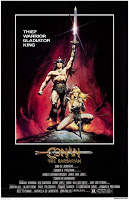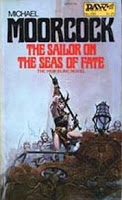Over at io9.com, Charlie Jane Anders asks “Why does live-action fantasy fail at the movies?” She then proceeds to give a few possible answers, including:
- Terrible movies
- Studio interference
- Nobody’s figured out how to do magic
- Game of Thrones-mania hasn’t hit movies yet
- The dire influence of Joseph Campbell
As she herself points out, there have been some incredibly successful fantasy movies and movie series in recent years. Lord of the Rings/The Hobbit, Harry Potter, and (ugh) Twilight all lead the pack. Against those 16 movies, she lists 17 box-office failures (including The Last Airbender and Eragon) and two mixed bags (Clash of the Titans and Percy Jackson).
However, I think she’s asking the wrong question. To be honest, I’m not sure what amounts to a nearly 50-50 track record counts as “live action fantasy fails at the movies.” I think the question is, “What makes a great fantasy movie?”
Here’s a hint: it’s exactly the same things that make a great science fiction movie, or superhero movie, or western, or horror film, or war movie, or drama, or romantic-comedy, or any other sort of movie you’d care to name:
- A good script
- Decent acting
- A budget suitable to accommodate the first two points
And that’s it! (The third bullet implicitly includes special effects.) I don’t think there is any particular conspiracy among the movie studios to put out fantasy movies that don’t hit all three of those points. There are enough awful science fiction movies, superhero movies, and romantic comedies that have exactly the same failings as the worst fantasy films.
Ms. Anders could have just stopped at her first point. A good movie is a good movie, regardless of genre, and there are no special rules that apply to fantasy movies that don’t apply to other genres.
Many of the commenters in Ms. Anders’ post make the point that the most successful fantasy films already have a built-in audience from fans of the books upon which they are based. Fair enough, but there are a ton of top-notch fantasy books and series that would make terrific books:
- Elric
- Elfquest
- Conan (if they do it more faithfully to the books)
- Chronicles of Amber
- The Dying Earth (Rowan Atkinson as Cudgel the Clever!)
- The Chronicles of Thomas Covenant
- Fafhrd and the Grey Mouser
- Dragonriders of Pern













Interesting post. I agree with what you said, but one thing caught my attention – the built-in audience. Here we are entering fan-boy territory and from what I've noticed, fans of a particular series will have very different expectations from film producers and general audiences. These days I don't expect films to be too faithful to the source material, whether it be Tolkein, Howard or Burroughs. I view it as an adaptation that is aimed at as broad an audience as possible. As a fan of fantasy fiction, I would love to see Elric or Fafhrd and the Gray Mouser on the big screen. But I realize it has to be a film that someone who hasn't read the books can "get" within 10 min of sitting in the cinema.
The biggest problem with Hollywood, IMHO, is that it is afraid to greenlight anything that they don’t think has a built-in audience. If it isn’t an adaption or a sequel, they don’t want to touch it.
And while there have been some great adaptions and great sequels, the best way to make great films is to concentrate on making great films instead of making adaptions and sequels.
They want to make Star Wars Episode VII instead of looking for the next George Lucas (or Tarantino) who synthesizes lots of influences into a film that stands on its own.
I agree with you that WotC has lots of books to draw inspiration for a D&D movie from. Though I'm not sure Drizzt is the best choice to focus on.
To an audience that doesn't know D&D, you have to explain the dark elf culture before the idea of a heroic drow becomes interesting. You also have issue with people who don't understand the movie and think it's racist.
@Robert Fisher – not only that, but the adaptations have to be culturally relevant. John Carter suffered for this, as it's not something the average person is familiar with.
@Philo – I think John Carter suffered more from intentional mismanagement of the advertising campaign than its lack of appeal to the non-familiar. I know plenty of people that were unfamiliar or only passing familiar with the books that enjoyed the movie.
I'm not a conspiracy theorist, but I do find it interesting that in the run-up to the John Carter release, Disney was negotiating with Lucas to buy the rights to Star Wars.
They tanked a Barsoom series of films in order to avoid "competing with themselves" with two big-budget science-fantasy series.
Now the Amber Chronicles would make a couple of great films!
I'd add to the list of things that might make for a good fantasy film.
Compelling, charismatic, relatable, characters (not all in the same character though)
A fantastic, but not wholly incomprehensible setting.
A story that doesn't reduce itself down to easy comparisons with other fantasy films. For example, any quest story is going to be dismissed as a Rings knock-off.
One problem with most fantasy (not all) is that it tends to be very derivative. (Part of the reason the Hero's Journey formula can be applied so easily to it.) Romantic comedies are almost the exact same story every time, but at least they appeal to 50% of the population and relate to very common human experience. Fantasy is a harder sell. One last item to add to the list, astute marketing.
See, jdh, I'd put all those elements under "a good script".
I think you're ignoring the innate problem that a novel doesn't adapt well to a movie. It's simply the wrong length and pacing. Consider your favorite scifi movies, most came from novellas at most and quite often they're short stories. Well or they're yet another comic book. A good novel simply has too much information in it.
The Brits have done a few good adoptions of Terry Pratchett – my favorite is Going Postal – so you can do these things on a budget. You just need good scripts and good actors. How much of an f/x budget would you need for "Lean Times in Lankhmar" anyway? Sadly, I think Rowan Atkinson is too old for Cugel now but Richard Coyle would work.
I don't think Thomas Covenant will make a good movie.
I concur the with the idea that the John Carter movie didn't do that well because for some reason I too felt that if I hadn't read the book the summer before it was announced that I would have been like the masses and not really enjoyed the movie.
Legend of the Seeker ran fairly recently. I think it's first episodes were hard to watch when the writers didn't follow the book until Season 2. I think because of Season 1's spotty quality that it wasn't renewed for Season 3. I thought they had a winning show after watching the last half of Season 2 and was a little surprised that Season 3 didn't get made.
I still want to see the DragonLance animated movies continued through "Dragons of Spring Dawning." I thought the movie illustrated Tanis' dilemma better than when I had read it. It's probably the best D&D movie yet and yet it has no visibility with the masses. You have to be a D&D aficionado to even know it exists.
Hell, I *am* a D&D aficionado and I didn't know it existed until I happened to see it on a shelf in Barnes & Noble.
But I agree, it's the best D&D movie yet made. More's the pity.
When i think of the "contempt for the source material", the first thing that springs to mind was the godawful Earthsea mini-series. It might not have been so bad that all of the characters were white, except for the one white character, who was played by an asian, and that the wizard school was integrated, y'know, had it not been for the fact that the races, cultures and genders of the characters were all of dire importance to the themes explored in the books.
The reviews of the Earthsea show have been so bad that I have stayed away from it.